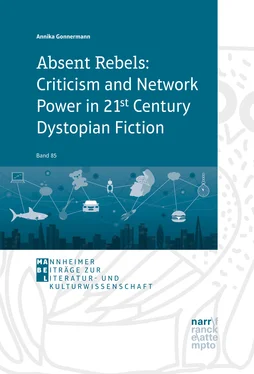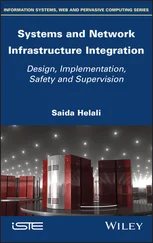Annika Gonnermann - Absent Rebels - Criticism and Network Power in 21st Century Dystopian Fiction
Здесь есть возможность читать онлайн «Annika Gonnermann - Absent Rebels - Criticism and Network Power in 21st Century Dystopian Fiction» — ознакомительный отрывок электронной книги совершенно бесплатно, а после прочтения отрывка купить полную версию. В некоторых случаях можно слушать аудио, скачать через торрент в формате fb2 и присутствует краткое содержание. Жанр: unrecognised, на английском языке. Описание произведения, (предисловие) а так же отзывы посетителей доступны на портале библиотеки ЛибКат.
- Название:Absent Rebels: Criticism and Network Power in 21st Century Dystopian Fiction
- Автор:
- Жанр:
- Год:неизвестен
- ISBN:нет данных
- Рейтинг книги:3 / 5. Голосов: 1
-
Избранное:Добавить в избранное
- Отзывы:
-
Ваша оценка:
- 60
- 1
- 2
- 3
- 4
- 5
Absent Rebels: Criticism and Network Power in 21st Century Dystopian Fiction: краткое содержание, описание и аннотация
Предлагаем к чтению аннотацию, описание, краткое содержание или предисловие (зависит от того, что написал сам автор книги «Absent Rebels: Criticism and Network Power in 21st Century Dystopian Fiction»). Если вы не нашли необходимую информацию о книге — напишите в комментариях, мы постараемся отыскать её.
Absent Rebels: Criticism and Network Power in 21st Century Dystopian Fiction — читать онлайн ознакомительный отрывок
Ниже представлен текст книги, разбитый по страницам. Система сохранения места последней прочитанной страницы, позволяет с удобством читать онлайн бесплатно книгу «Absent Rebels: Criticism and Network Power in 21st Century Dystopian Fiction», без необходимости каждый раз заново искать на чём Вы остановились. Поставьте закладку, и сможете в любой момент перейти на страницу, на которой закончили чтение.
Интервал:
Закладка:
Jaeggi’s third and most ambitious type of criticism is subsumed under the term of ‘immanent criticism.’ Similar to internal criticism, this mode appeals to a normative yardstick already inherent in the object/person they want to criticise. This form of criticism is thus “not conducted from an imagined Archimedean point outside of the reality to be criticized“ (ibid. 190) like external criticism. But, as Jaeggi claims, immanent criticism is “normatively stronger” than external or internal criticism for it “find[s] the new world through criticism of the old one” (190). As Hans Arentshorst summarises,
[i]mmanent criticism differs from both these approaches because it starts from the problems and [inherent] contradictions of a life-form. In this sense it is more negativistic and formal than internal criticism: it is not interested in recovering certain values, but it wants to contribute to the transformative potential of a life-form by raising consciousness about its internal problems and contradictions. In this sense, immanent criticism is context-dependent, since it analyzes the internal problems and contradictions of a life-form, but it is also context-transcending because it aims at the transformation of the current life-form in order to overcome its problems. (273)
Assuming that the standards set by the object of criticism are “contradictory in themselves ” (Jaeggi, Critique 190, emphasis in the original), immanent criticism, then, anchors its method within the criticised reality itself, encountering it (ideally) without any ideologically framed preconceived ideals. It is therefore a new type of criticism due to its inherent objectiveness.8 It does not “merely proceed from the critic’s subjective critical intention” (ibid. 191f.) but creates parameters for the object of criticism to criticise itself. Fundamentally, immanent criticism is only possible in constellations, in which “the object of criticism […] has succumbed to a crisis of itself” (ibid. 192). Immanent criticism operates thereby to a certain degree outside of any ideology, since it refrains from approaching the object of criticism with preconceived normative standards.
Applying a theoretical framework, the critic’s task is to – so to speak – ‘detect’ a crisis: “the crisis qua crisis of the objects (as a problem lying in the social relations) must always be analyzed and uncovered in the first place at the theoretical level” (ibid.). Therefore, it is imperative to frame the criticism theoretically: “[w]hereas internal criticism is a mundane procedure that is applied in one way or another in a variety of situations, immanent criticism is guided by theory” (ibid. 191). Immanent criticism constructs links and connections between two seemingly unrelated phenomena and thus originates in the school of thought of dialectics as popularised by Georg Friedrich Wilhelm Hegel in Phenomenology of Spirit (1807) and Science of Logic (1813). This philosophical method “relies on a contradictory process between opposing sides” (Maybee), that is to say, observing two seemingly antithetical concepts, such as life and death. Upon closer inspection, however, Hegel argues that binary distinctions are dissolved into a continuum, in which one concept embodies the other: life depends on death (in the form of digestion, consumption); death does not exist without life (cf. R. Winter); conceptual boundaries merge and flow into another until they are declared invalid and shown to spring from one origin.
Jaeggi’s immanent criticism docks onto Hegel’s idea of ‘positive Vernunft.’ This mode of criticism refuses to remain caught in dichotomous patterns. On the contrary, the aim of immanent criticism is to decipher when and how concepts flow into each other, showing “that there is a connection here at all, and in doing so to distinguish the two (‘separated’) moments as part of this connection, which as a result is marked by a contradiction” (Jaeggi, Critique 198). Eventually, without immanent criticism and the use of theoretical analysis, certain co-dependant phenomena might not become visible at all. Jaeggi calls them ‘genuinely immanent problems,’ shortcomings arising out of the inconsistencies of a system. Contrary to problems that have their cause externally (a people suffers from starvation because of a draught) or internally (a people suffers from starvation because they struggle with the climatic conditions and fail to make adequate provisions in form of food reservoirs etc.; cf. ibid. 165ff.), these problems are a direct result of systematic inconsistencies and only perceivable by thinking consequently in dialectics. These problems arise because of and out of a given form of life and are therefore to be analysed according to the standards of immanent criticism (cf. ibid. 167f.).9
Fleshing out her ideas, Jaeggi introduces Karl Marx’ critique of bourgeois society, arguing that his criticism of capitalist society relies on the technique of immanent criticism. Criticising the capitalist system, Marx points out the immanent inconsistencies of the system. He talks about the ‘laws of motions,’ for instance, the paradox of social relations within free-market capitalism: while the system encourages people to cut off their social ties and propagates individual responsibility within the market in order to prosper from rags to riches, it paradoxically relies fundamentally on the safety net that is constituted by the social unit of the family.10 Mark Fisher has summarised the points made by Marx quite concisely:
The values that family life depends upon – obligation, trustworthiness, commitment – are precisely those which are held to be obsolete in the new capitalism. Yet, with the public sphere under attack and the safety nets that a ‘Nanny State’ used to provide being dismantled, the family becomes an increasingly important place of respite from the pressures of a world in which instability is a constant. The situation of the family in post-Fordist capitalism is contradictory, in precisely the way traditional Marxism expected: capitalism requires the family (as an essential means of re-producing and caring for labor power; as a slave for the psychic wounds inflicted by anarchic social-economic conditions), even as it undermines it (denying parents time with children, putting intolerable stress on couples as they become the exclusive source of affective consolation for each other). (32f.)
Immanent criticism, then, approaches the item on display supported by the help of theory in the above example, a Marxist reading of bourgeois society.
Ultimately, the aim of any criticism is a transformation of the status quo. While external criticism always argues from a normative point of view, meaning it needs an alternative for its very existence and function, internal criticism can draw its persuasiveness from the criticised object itself, simply by holding it to claims previously made. Immanent criticism does not immediately offer a ready-made alternative because it “is oriented less to the reconstruction or redemption of normative potentials than to the transformation of existing conditions in ways that are facilitated by the immanent problems and contradictions of a particular social constellation” (Jaeggi, Critique 190f., emphasis in the original). This means, at first glance, immanent criticism is not overly productive in terms of alternatives. It might therefore disappoint those social reformers looking for ways to radically challenge the big picture and search for new models for society as a whole. But Jaeggi argues that we must reconsider our conception of ‘alternative.’ Immanent criticism produces an alternative ex negativo and should be thought of as transformative criticism: “the transformation process is suggested by the situation itself to a certain extent; it is prefigured in the situation, even if it exceeds the latter” (ibid. 209). For this most ambitious type of criticism, the performative gesture of critique suffices. Assuming that the criticised community can transform, immanent criticism does not need to spell out an explicit alternative to function successfully, for it “construes the crisis-prone contradiction that confronts it and confronts us not only as necessary but also – in contrast to the procedure of internal criticism – as productive” (ibid.). Jaeggi asserts that “the possibility of resolving [the contradiction] follows from criticism of the deficient state itself” (ibid.). To cite the words of Theodor W. Adorno: “[t]he False, once determinately known and precisely expressed, is already an index of what is right and better” ( Critical Models 288).11 Knowing what we do not want prefigures what is desirable: dystopia prefigures eutopia.
Читать дальшеИнтервал:
Закладка:
Похожие книги на «Absent Rebels: Criticism and Network Power in 21st Century Dystopian Fiction»
Представляем Вашему вниманию похожие книги на «Absent Rebels: Criticism and Network Power in 21st Century Dystopian Fiction» списком для выбора. Мы отобрали схожую по названию и смыслу литературу в надежде предоставить читателям больше вариантов отыскать новые, интересные, ещё непрочитанные произведения.
Обсуждение, отзывы о книге «Absent Rebels: Criticism and Network Power in 21st Century Dystopian Fiction» и просто собственные мнения читателей. Оставьте ваши комментарии, напишите, что Вы думаете о произведении, его смысле или главных героях. Укажите что конкретно понравилось, а что нет, и почему Вы так считаете.












